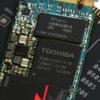Final Words & Conclusion
Final Words & Conclusion
Toshiba releases a product that ticks the right boxes. You get the advantage of NVMe SSD performance, the reliability and endurance of TLC based NAND and they top it off with a 5-year warranty. Anything and everything, however, is relative to price, and Toshiba is doing it right there as well, 500 GB costs you roughly 10 cents (depending on your currency). For that money, you receive a proper, really proper performing NVMe 1.3 M.2 SSD.
Performance
Technologies like TLC and QLC face some challenges writing more bits per cell of NAND, we noticed a dropoff in performance with mixed heavy workloads that exceed writing ~12 Gigabyte continuously. After you pass that value of writes (and I do mean continuous sustained/linear writes minute after minute), then the SSD buffer is full and starts to write directly to TLC NAND. This, in a nutshell, is what you need to be aware of with TLC and QLC SSDs. IOPS performance is good on this unit, really good. The overall workload traces also indicate this SSD to be extremely capable and fast. Out of the dozens of SSDs we have tested, this one makes the top 10 (until you run out of that buffer). This SSD will write as fast as it can through a cache, once that cache runs dry you drop in write performance. Before you run into that 'issue' you need to realize the complexity of workload. We have written 12 GB continuously at max speed before the SSD dropped to 600~700 MB/sec (which is till hugely fast for something priced 10 cents per GB). That is the one difference with Samsungs 970 EVO (Plus), they can keep up that write hole up-to roughly 80 GB for the 1 TB model. Also please do realize that the performance in writes differs per volume size you purchase, a 512 and 256GB model would write slower. So we are strictly compressing this conclusion towards the 1 and 2TB models. So the question, how often do you write such large files? If that answer is likely to no and far less.
Concluding
The Toshiba RC500 500Gb SSD is as mentioned in the first paragraph pretty interesting in many ways. Warranty, performance and pricing seem to be spot on and IOPS numbers really shine. The TBW value of 200TB written feels a little shy compared to others, but the truth is also that no company these days explains how they get to that number anyway. Toshiba is guaranteeing 200TB written combined with 5 years warranty, whichever one comes first. If you write 50GB each and every day you are looking at nearly 11 years of writes before you pass that TBW value. I don't know about you, but I do not write 50GB per day every day, all year. It's a fast TLC based M.2 SSD that ticks all the right boxes. The one negative observation is that under heavy writing load, the controller heats up significantly causing a throttle down of performance to cope with that heat. Simply put this SSD under a heatsink, like the one provided with your motherboard and let the cooling do its work. That problem is then solved.
It is and remains to be a strong performer, even without heatsink. The one caveat is the aforementioned TLC write hole which we measured once you pass that 12GB region of continuous writing. That's a value that requires really significant workloads, and for a DIY or game PC it's a value that likely isn't relevant for most of us. Once the write hole does kick in, you're still hovering at very decent but closer to SATA3 like write performance. At a price hovering at 10 cents per GB for the 500GB model, I would certainly opt this SSD. I do think that Toshiba should have offered bigger versions like 1TB and 2TB as there is a difference to be made and found for the PC gaming community. One last comment, the baby blue PCB has got to go. Please Toshiba, for future products go with a black PCB. The MSRP for the 500GB model as tested is 49 USD / 59 EUR, that's an MSRP, so once volume kicks into the market, you can deduct likely another 10% from that value, and that's the word what it is all about these days, value.
Recommended Downloads

